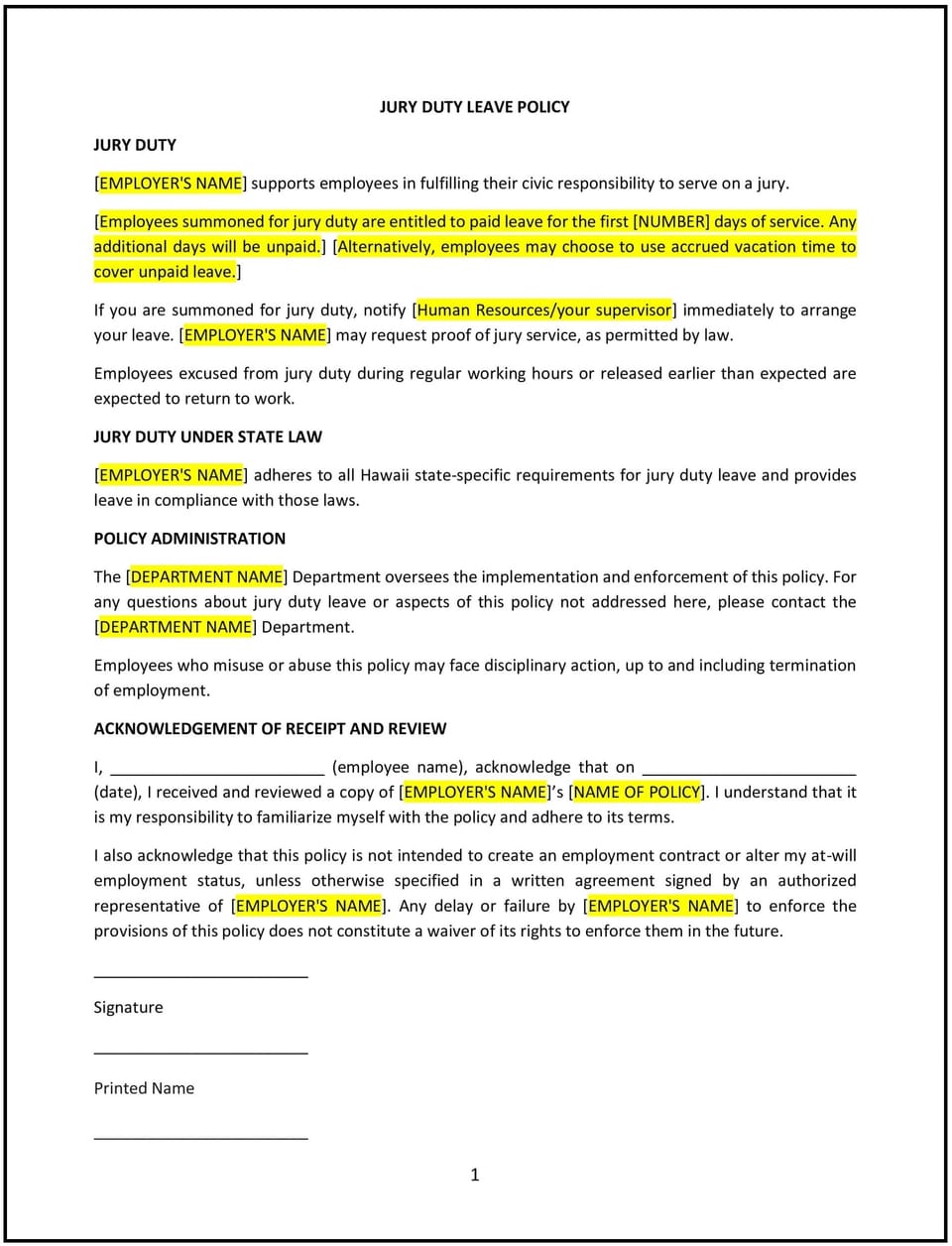Jury duty leave policy (Hawaiʻi): Free template

Jury duty leave policy (Hawaiʻi)
A jury duty leave policy helps Hawaiʻi businesses establish guidelines for employees who are called to serve on a jury. This policy outlines procedures for requesting leave, managing work responsibilities, and ensuring employees are compensated during their service, while addressing Hawaiʻi’s unique legal and cultural considerations. It is designed to support employees in fulfilling their civic duties while minimizing disruptions to business operations.
By implementing this policy, businesses in Hawaiʻi can demonstrate their commitment to civic responsibility, maintain positive employee relations, and comply with state laws.
How to use this jury duty leave policy (Hawaiʻi)
- Define eligibility: Specify which employees are eligible for jury duty leave, such as full-time or part-time staff, and any tenure requirements.
- Establish leave procedures: Provide clear instructions for employees to request jury duty leave, including submitting a jury summons and notifying their supervisor.
- Address compensation: Outline whether employees will be paid during jury duty leave, and if so, for how many days, in alignment with Hawaiʻi state laws.
- Manage work responsibilities: Provide guidelines for redistributing work or adjusting schedules to accommodate employees on jury duty leave.
- Communicate the policy: Share the policy with employees during onboarding and through internal communications to ensure awareness and understanding.
- Train managers: Educate supervisors on how to handle jury duty leave requests and manage team workloads during an employee’s absence.
- Monitor compliance: Regularly review jury duty leave requests to ensure adherence to the policy and address any issues promptly.
- Review and update the policy: Regularly assess the policy’s effectiveness and make adjustments as needed to reflect changes in laws or business needs.
Benefits of using this jury duty leave policy (Hawaiʻi)
This policy offers several advantages for Hawaiʻi businesses:
- Supports civic responsibility: Encouraging employees to serve on juries demonstrates the business’s commitment to community engagement.
- Enhances employee morale: Providing paid or unpaid leave for jury duty shows employees that their civic duties are valued.
- Maintains positive relations: A clear and supportive policy fosters trust and goodwill between employees and management.
- Reduces disruptions: Structured procedures help minimize the impact of jury duty leave on business operations.
- Aligns with legal requirements: The policy helps businesses comply with Hawaiʻi state laws regarding jury duty leave.
- Encourages accountability: Employees understand their responsibilities for notifying the business and managing their work before taking leave.
- Builds trust: Employees are more likely to trust leadership when they see a commitment to supporting their civic obligations.
Tips for using this jury duty leave policy (Hawaiʻi)
- Communicate the policy effectively: Share the policy with employees during onboarding and through regular reminders, such as emails or posters in common areas.
- Provide training: Educate managers on how to handle jury duty leave requests and manage team workloads during an employee’s absence.
- Be flexible: Work with employees to adjust schedules or redistribute work to accommodate their jury duty obligations.
- Monitor compliance: Regularly review jury duty leave requests to ensure adherence to the policy and address any issues promptly.
- Be transparent: Clearly explain the policy’s purpose, benefits, and expectations to employees to build trust and cooperation.
- Review the policy periodically: Update the policy as needed to reflect changes in laws or business needs.
Q: Why should Hawaiʻi businesses adopt a jury duty leave policy?
A: Businesses should adopt this policy to support employees in fulfilling their civic duties, maintain positive employee relations, and comply with state laws.
Q: Who is eligible for jury duty leave?
A: Eligibility should be clearly defined in the policy, typically including full-time or part-time employees who receive a jury summons.
Q: How should employees request jury duty leave?
A: Employees should follow the procedures outlined in the policy, including submitting a jury summons and notifying their supervisor.
Q: Should businesses pay employees during jury duty leave?
A: Businesses should outline whether employees will be paid during jury duty leave, and if so, for how many days, in alignment with Hawaiʻi state laws.
Q: How should businesses manage work responsibilities during jury duty leave?
A: Businesses should provide guidelines for redistributing work or adjusting schedules to accommodate employees on jury duty leave.
Q: What training should businesses provide to managers?
A: Businesses should educate managers on how to handle jury duty leave requests and manage team workloads during an employee’s absence.
Q: How often should the policy be reviewed?
A: The policy should be reviewed annually or as needed to reflect changes in laws or business needs.
This article contains general legal information and does not contain legal advice. Cobrief is not a law firm or a substitute for an attorney or law firm. The law is complex and changes often. For legal advice, please ask a lawyer.


